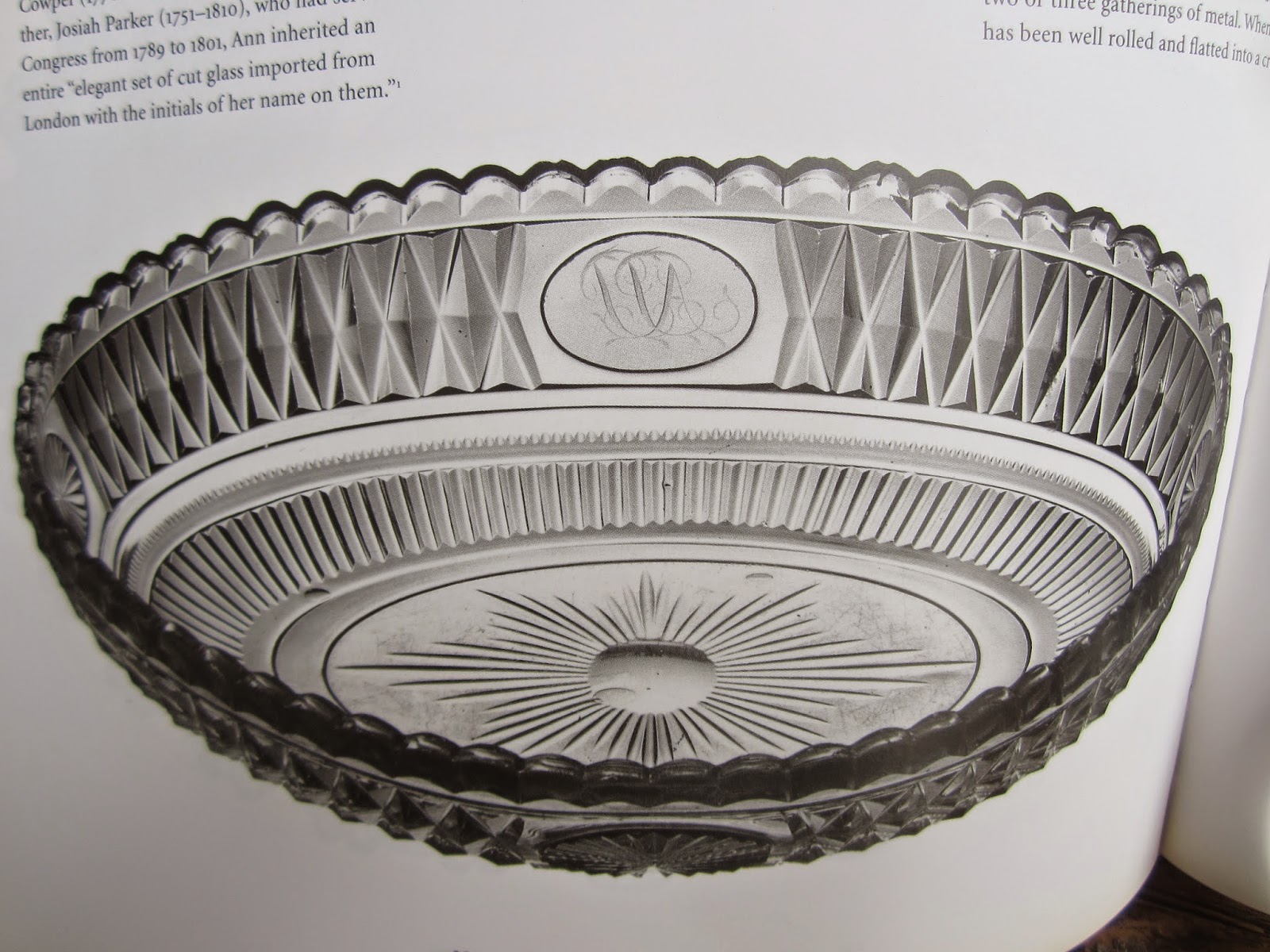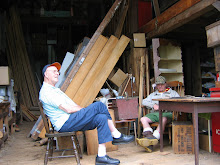Old New England Glassware in the Home
Part Four
"Good Luck With That"
At
1750, in New England, between
‘several’ and ‘numerous’ endeavors-to-make-glass had occurred, or were
attempted and... ‘fell back’.
‘Everything’ was ‘right’ ‘on paper’ at the tavern for that swell idea
(make glass) to ‘happen’. Men,
money, rum, demand (for glassware), raw materials, location, rum again... money
again (venture capital), demand again, rum again...: In the morning it was a ‘go’. “Remember?”
I
am not writing about glass making in New England. Or about how to make glass. Glass is a metal best made by fire and chemistry. In New England... and simplified to
redundancy... glass required sand (as ‘on a beach’) and fuel to melt the sand
(as in four foot logs burning twenty-four hours a day continually). That; sand and wood, was ‘we have
that. Add ‘men’ ‘working’ with
shovels and axes (include rum ration), carts, animals pulling the carts.... a
‘furnace’, a building(s)... a ‘the owners’, a ‘glass maker’ and... another
small group of men from Europe who do not speak English who ‘know how to do
this’ (make glassware with the glass metal)...:
So
we go down to the beach to see how this is going and notice that already they
have ‘exhausted’ a considerable body of ‘fuel’ ‘near’ ‘the furnace’. And... have only a small gathering of
rather crude sort-of-look-like European glass bottles “Huh”. As is famously said of venture
capitalized commercial endeavor ‘launches’ in old New England: “That’ll launch it but I don’t know how
long it’ll stay up.” Meaning:
Did
you plan on walking down to the beach and buying some... empty bottles? The makers actually had to load the
‘glassware’ into a cart (in the Midwest [Mantua] they actually loaded a canoe)
and go door to door peddling... to a community that did not have any money or
any real ‘need’ for ‘glassware’... although they did ‘like’ the ‘bottles’.
So
glass making in old New England at 1750 right on up to 1820 (1815) was... ah...
‘not doing well’. One could ‘loose
money’ ‘doing that’.
Example?
On
the first page of the catalog of the ‘their collection’; the first item, #1, is
a ‘snuff bottle’ ‘attributed to’ (being made at) the Germantown (Braintree, MA)
glass... ah...’works’. On the
beach. From there on no further
mention is made of this... old New England glassware. Just one entry; the number one... entry. It’s easy to miss.
The
book; a reference book, too, makes it ‘easy to miss’ too. Weighing ‘a ton’ this slip cased two
volume set is
Absolutely
essential for one active with old New England glassware (this does NOT include
‘old New England glassware in the home’) to... ah... ‘be familiar with’
(memorize). Don’t worry, I work
with NO ONE who even has a copy let alone ‘has looked at it’. That’s right: Don’t worry... because I
DO
NOT CARE
And
Work
with uninformed-by-choice idiots all the time too.
The
book is Ken Wilson “The Toledo Museum of Art American Glass 1760-1930, Hudson
Hills Press, NY, 1994. Good luck
with that.
IF...
one should ever... ‘get serious’ about ‘old New England glassware NOT in the
home... one WILL have to ‘contend with’ (confront?) this... book.
MEANWHILE
more adroit venture capitalists were ‘introducing’ old ENGLSH and IRISH
glassware into the old... New England... HOME. “WHAT IF” they said... “we stow away GLASSWARE made HERE and
ship it OVER THERE... sort of quietly.... and when it gets there... we sell
it... sort of quietly”
“I
like that idea. Count me in”.
“Done”.
This
‘selling glassware’ was a naturally exclusive niche market. It was not intended for the pioneer log
cabin set’s domestic decorative impulse.
It was... best for and there found in the homes of, for example, the
ruling merchant aristocracy who had ‘ventures’ (slave trading and sugar plantations)
in the West Indies and... their ‘homes’ (estates) ‘in New England’. Need to read up on that? I recommend C. S. Manegold “Ten Hills
Farm”, Princeton Univ. Press, Princeton, NJ, 2010.
The
tale told in this book... is a horrific... and... ‘one needs to know this
tale’... of old, old New England that includes places... one never thought
of (today’s tourist islands)
and... there at these places doing things one never thought of (slavery until
death)... and... old houses in the Boston area one may visit, old oil paintings
there too one may visit, words like ‘Harvard’... LARGE ‘land holdings’ in old New England, places like the
Royal River ( end ‘L’ dropped from the original spelling) in Yarmouth (Maine) where there is, at
the falls (and under –actually under- the interstate overpass on Route 88, a
bronze plaque on a stone monument for a man who was killed and scalped ‘there’
while ...serving the interests of the land owner who... moved his operations to
Boston so to avoid ‘further problems’....and... no mention of glassware ever.
BUT: I assure you that THESE PEOPLE did have
GLASSWARE in their HOME in old New England. The SLAVE always kept the glasses clean and the decanter
FULL. Got it? And good luck with that (this book).
FROM
this slave-serves-master-using-glassware... in the old New England home, this
import venture glassware from England and Ireland (“Anglo-Irish” from now on)
but including too... glassware
from... Germany, Austria, ah.., Italy, Belgium... FRANCE and... ‘the Mediterranean
region”...: “Anglo-Irish”...
GLASS... WARE... trickled down to become... glassware... in old New England
homes...
That
I
STILL
FIND
IN
The
old New England home.
It’s,
like, most times, all beat up and, like, ah... “WHAT’S THAT?”. What does that mean? It means that thrift shops, three day
‘estate’ tag sales and ‘yard’ sales are my best source for a perpetual “FIND
THAT” ‘for nothing’ (no cost):
“ITS ALL CHIPPED”
“Good
luck with that.”
There
is an antiquarian market for “it” (Anglo-Irish glassware). There are people who ‘like it’... know
it.... love it. There are
‘collectors’. There are snotty ‘if
you don’t know what that is then you wouldn’t know if you stepped in dog...
poop... either’. For this last, I
say... there should be that attitude.
It goes back to the ‘those people’ and their... ‘juice glasses’... in
their “MY” “OLD” New England home.
IF
I
have a ‘relic’ condition Anglo-Irish decanter set out for sale... no... one...
ever... ah... “asks”. IF I have
six juice glasses set out full of JUICE the same THEY will take one (a juice
glass) without comment and start sipping from it (“OH I THOUGHT THOSE WERE TO
DRINK [for free]”).
What
is the net worth of Anglo-Irish glassware?
I don’t spend a lot of time ‘helping people with this’
I don’t spend a lot of time ‘helping people with this’
Source of ....
Glassware
in the old New England home.
One
is, with this first responder New England glassware,
A ‘there’ or... a ‘there-not’. And: On the own (of self and of possess).
We
move on to 1815.























































